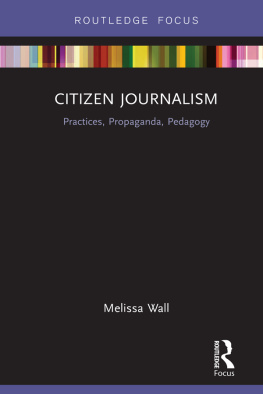In taking a comparative glocal dimension this research broadens the media sociology perspective, going beyond the traditional Country A vs. Country B comparison to provide a valuable understanding of international newswork in glocal space.
Stephen D. Reese, Jesse H. Jones Professor of Journalism, University of Texas
A fascinating analysis of network newswork, a pioneering concept employed to review the hierarchy of influences on journalists in domestic and transnational news bureaus as they decipher how to filter, integrate and present unverifiable, informal and personal information as accurate news. An incisive account of the making and presentation of news in an era where mainstream networks cannot choose to ignore multiple sources of information offered through social media.
Edmund Terence Gomez, Professor of Political Economy, University of Malaya
Media Globalization and Digital Journalism in Malaysia
The media ecology within which conventional mainstream journalism currently operates has undergone major transformations since the advent of social media. These transformations arise from the disruption brought upon by the emergence of networked, interactive platforms and user-driven online applications including social media, blogs and alternative citizen news sites.
This book analyses networked forms of journalistic production at traditional news organizations and their conventional news channels. Focusing on case studies from Malaysia, it examines current transformations to the norms, practices and values of conventional news production. Drawing upon a recent global-comparative turn in journalism studies and parallel efforts to de-Westernize communication theory, this book suggests an innovative glocal comparative approach to analyse network newswork among global, transnational, and local news organizations, including Al Jazeera and Bernama TV, located within the same geographical locality of Kuala Lumpur, Malaysia. This author uses an empirically-grounded conceptual framework for exploring and understanding recent transformations that user-driven networked resources bring to professional journalists daily work of producing news. Discussing the implications of network newswork on the wider global journalistic sphere, the book elucidates a tiered model of networked sources and expounds upon journalisms deepening of the digital divide in its inadvertent muting of the voices of non-networked communities that are switched off from the global news sphere and its network society.
A fresh perspective on the analysis of globalization in the media and a useful guide for gaining access into media organizations and securing cooperation of organizational members for research, this book will be of interest to researchers in the field of Asian Media and Communication Studies, Journalism Studies, Political Communication and Sociology of Journalism.
Amira Firdaus received her PhD from the University of Melbourne, Australia, where she was a member of the founding editorial team for Platform: Journal of Media and Communication. She is currently Senior Lecturer at the Department of Media Studies, University of Malaya, Malaysia, where she recently concluded a three-year term as Managing Editor of the Malaysian Journal of Media Studies.
Routledge Research on Media in Asia
Media Globalization and Digital Journalism in Malaysia
Network Newswork
Amira Firdaus
First published 2018
by Routledge
2 Park Square, Milton Park, Abingdon, Oxon OX14 4RN
and by Routledge
711 Third Avenue, New York, NY 10017
Routledge is an imprint of the Taylor & Francis Group, an informa business
2018 Amira Firdaus
The right of Amira Firdaus to be identified as author of this work has been asserted by her in accordance with sections 77 and 78 of the Copyright, Designs and Patents Act 1988.
All rights reserved. No part of this book may be reprinted or reproduced or utilised in any form or by any electronic, mechanical, or other means, now known or hereafter invented, including photocopying and recording, or in any information storage or retrieval system, without permission in writing from the publishers.
Trademark notice: Product or corporate names may be trademarks or registered trademarks, and are used only for identification and explanation without intent to infringe.
British Library Cataloguing-in-Publication Data
A catalogue record for this book is available from the British Library
Library of Congress Cataloging-in-Publication Data
Names: Amira Firdaus, author.
Title: Media globalization and digital journalism in Malaysia : network
newswork / Amira Firdaus.
Description: New York : Routledge, 2018. | Series: Routledge research on
media in Asia | Includes bibliographical references and index.
Identifiers: LCCN 2017022158 | ISBN 9781138672697 (hardback) |
ISBN 9781315562391 (ebook)
Subjects: LCSH: Mass media and globalizationMalaysia. | Online
journalismMalaysia. | Digital mediaMalaysia.
Classification: LCC P92.M3 A47 2018 | DDC 302.23/09595dc23
LC record available at https://lccn.loc.gov/2017022158
ISBN: 978-1-138-67269-7 (hbk)
ISBN: 978-1-315-56239-1 (ebk)
Typeset in Times New Roman
by Apex CoVantage, LLC
From YouTube videos of earthquakes and armed conflicts, to politicians Twitter feeds, to trending segments of primetime newscasts, social media content is now regularly used to complement traditional news reporting. We know that social media is bringing disruption to journalism that we know. What we know little of, however, is the dynamics of this user-driven networked digital disruption, particularly within conventional journalistic contexts (i.e. institutional, mainstream news media). I wish to propose network newswork as an emerging practice of news production which allows journalism to capture the complex journalistic space which integrates user-driven networked informational sources into various stages of news production. This book is one attempt to ask and answer a question often overlooked in current excitement over new networked forms of journalism: Within traditional, institutionally-driven journalistic settings, how is network newswork integrated into routine newswork? Drawing upon a recent global-comparative turn in journalism studies, I suggest a glocal comparative approach to this question by focusing my empirical analyses on expatriate and local journalists all based in the same locality of Kuala Lumpur, Malaysia, but all working for news outlets that operate in distinctly different news spheres. Thus, I wish to explore how globalized informational flows are used within different glocal journalistic settings, represented by global channel Al Jazeera English s Kuala Lumpur operations, and the newsroom of Malaysian national channel Bernama News Channel (formerly known, and referred throughout this book, as Bernama TV ), as well as four other transnational outlets. Based on semi-structured interviews with journalists recruited via a chain of referrals within professional networks of journalists, this book takes a hierarchy of influences approach to exploring how institutionally-based, mainstream journalists deal with online, networked sources. What I found was that across global, local and glocal news spheres, commonalities abound within microsociological news practices. However, ideological macrosociological differences are inherently real, with real implications of giving rise to divergent understandings of social medias role as resources for news production. Interestingly, as this book will show, commonalities and divergences across news spheres are the result of ideological-institutional and professional-journalistic-routines structuration of individual journalists agency in appropriating user-driven networked media as tools of newswork. The book also discusses the implications of network newswork on the wider global journalistic sphere. I elucidate a tiered model of networked sources and expound upon journalisms deepening of the digital divide in its inadvertent muting of the voices of non-networked communities that are switched off from the global news sphere and its network society.





